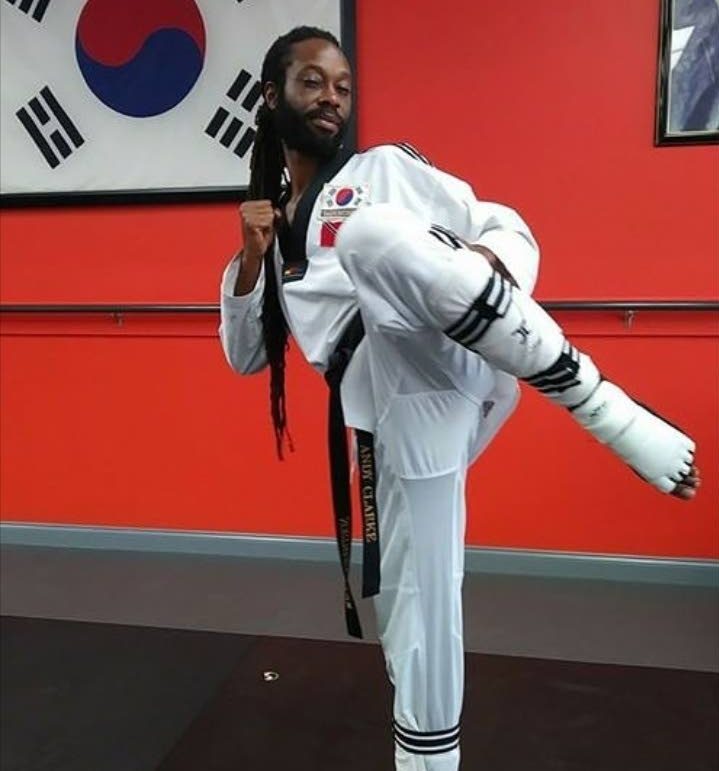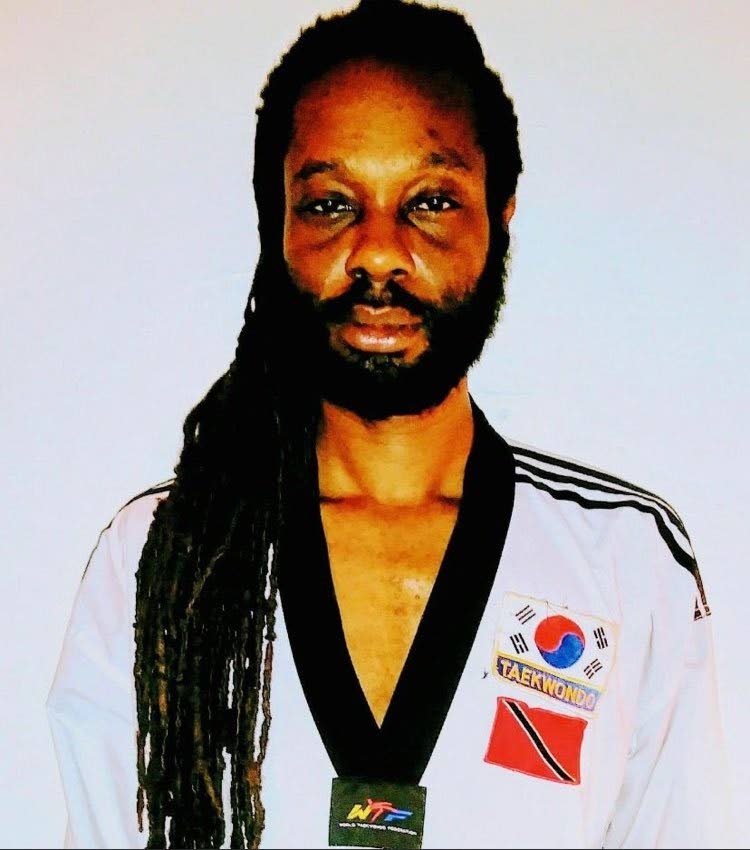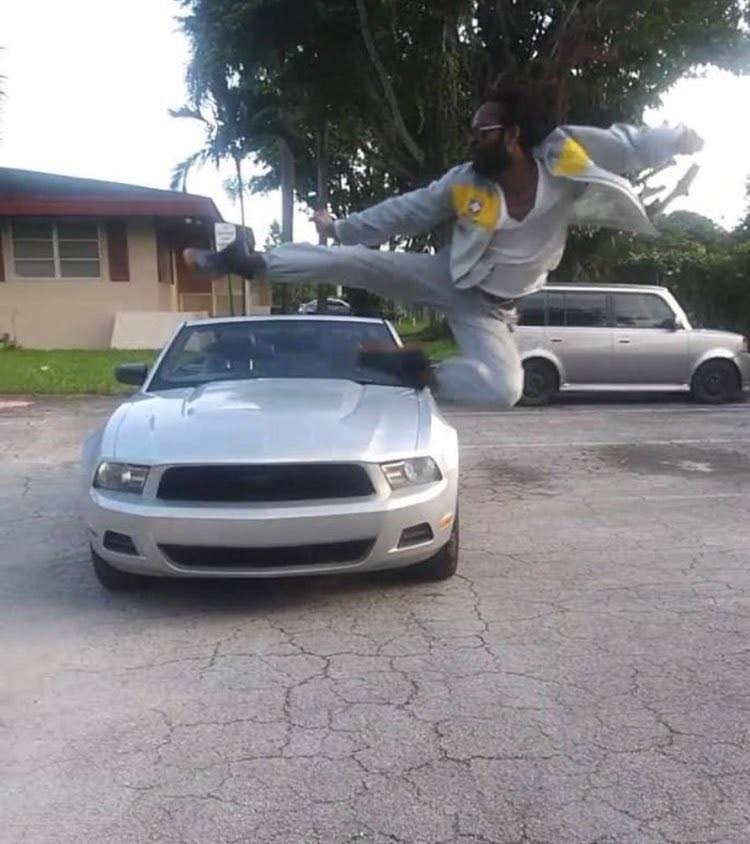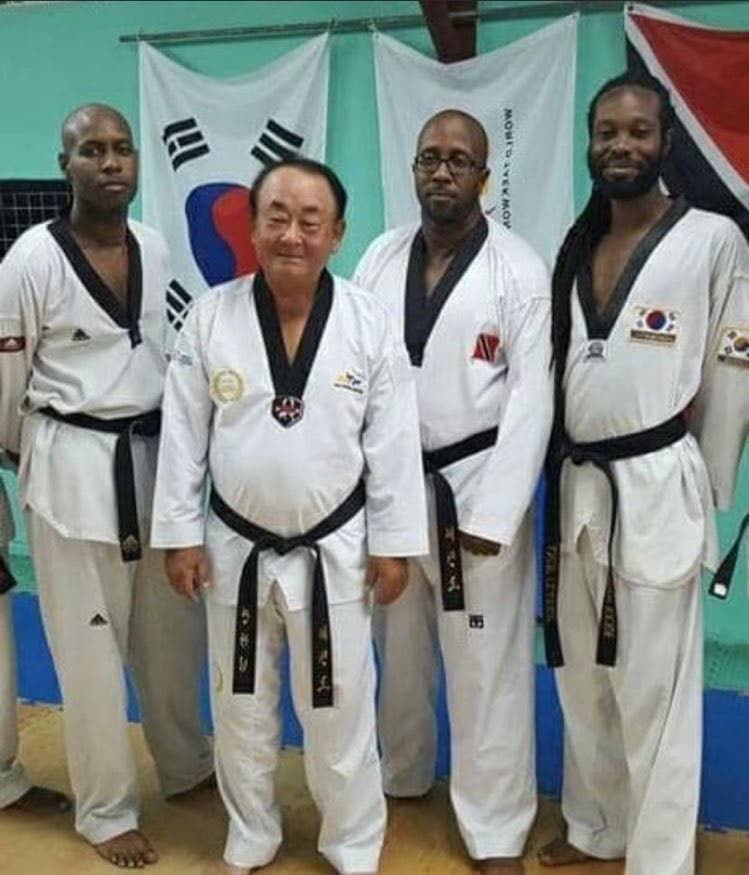Julius Clarke the taekwondo master

On May 30 Julius Erving Wolfgang Anderson Clarke received a call in Miami that he was now a taekwondo master. It was the culmination of a journey of more than three decades that began with a dojo back home in Trinidad.
Newsday recently interviewed the 38-year-old Clarke about his accomplishment.
Originally from Diamond Vale, Diego Martin, and the last of three boys, he explained his life in martial arts began because of his father, the late Elton Clarke. His father convinced his elder brother Stokely to do martial arts, reasoning that his mother only had boys "and they need to defend themselves."
His father was living on Tragarete Road, next door to taekwondo grandmaster Jin Young Jung and his dojo. Jung, a Korean, is the founder and head of Jungs School of Martial Arts and introduced taekwondo and hapkido to TT in 1976.
"It could have been karate, but we fell on this side of the fence," Clarke said.
Karate is Japanese and kung fu is Chinese, while taekwondo originated in Korea around the 1940s. In 2000 Taekwondo became an official Olympic sport: the only other Asian martial art in the Olympics is judo.

Clarke said while karate focuses on putting all power into one-touch taekwondo is more dynamic, with a free flow of kicks and punches geared towards making the body like a machine.
"You use your hands and feet to defend yourself. It is a continuously flowing, dynamic movement."
The journey begins
Following in the footsteps of his elder brother, Stokely, and his late brother, Russell, at six, young Julius donned the dobok (uniform worn by practitioners of taekwondo and other Korean martial arts) for the first time.
"At first glance, it looks attractive. Very dynamic. Jumping around. Kicking and flying through the air.
"I was also a fan of kung fu movies and 'kick-up' movies with (the character) Silver Fox that aired weekends in Trinidad. I wondered, 'Where can I do that?'"
He recalled when he started learning taekwondo it was very painful.
"Master Jung did not hold any punches or kicks."
He and his brothers would train on Tuesdays and Thursdays for three hours at Belle Smythe Street, Woodbrook, near Fatima College. They would do a one-hour warm-up including cardio and then technique and technical drills. When they had tournaments approaching they would train every day.
Clarke was thrown into the tournament world at age nine. He said even though he was geared up to protect his chest and head, there were still brutal hits to the body and he received his share of injuries: "A lot of sprained ankles. I had a busted eye and had to wear an eye patch (for a time). But it was (for the) glory. At the end of the day, I was doing things others could not do."
Asked if his parents were concerned about his injuries, Clarke said they were both "tough" and not overly concerned.
"It is a full-contact sport. They knew the risks. Everyone has a sport of choice. This was ours from day one."
The champion
And it was a sport Clarke was very successful at. He participated in the annual national championships held at either the Jean Pierre Complex or Mucurapo Senior Comprehensive, and never lost one.
He also participated in Caribbean championships and the Pan American Games and won tournaments all over the region. And with his wins, he received his share of fans.
"I liked the attention of it. It was painful, but very rewarding."
He described his tournament experience as a youth as "literally a blur," because he is nearsighted and did not wear contact lenses then.

"I also had to remove my glasses to fight, for obvious reasons."
His coach and brother Stokely always told him to just aim for the red or the blue (meaning the chest or headgear of the opponent.)
"Because of my poor vision, I never really saw faces during a fight, just colours as targets. This eventually changed when I grew old enough to wear contact lenses, which was a game-changer, as only then I saw the opponent's facial expressions during a fight."
How does one progress in taekwondo? Clarke explained it has a similar belt system to karate (kung fu has no belt system or ranking), where you start at white with your "empty cup."
"With the amount of training the belt gets darker until black."
He said every school has a different system on how belts progress, but it is mainly white, yellow, green, blue, red, brown, black. Some schools would add tips to belts as a "dangling carrot" and as a way to "make a business."
"With the old school, it took a long time moving forward."
Clarke was stuck on a red belt for a long time (about three years) and even considered dropping out.
"Master Jung always told me if I wanted to advance I had to win tournaments. If I did not win I would not go anywhere. That was my persuader."
In and out
Clarke left Trinidad for the US to get his undergraduate degree in criminal justice-forensics in 2001. He was 18 then and was still a brown belt (one belt shy of black).
He left the US and returned in 2008 at 25, and restarted taekwondo training as a brown belt.
He left Trinidad again in 2013 to do a masters in international law at the University of Miami. By then, he had achieved his first dan (a word commonly used in Korean martial arts to denote a black belt and translates to "level" or "stage") black-belt certification after winning the nationals every year and reigning as lightweight champion from 2009-2012.
How was it returning to Trinidad to enter the national championship as an adult?
"It was breathtaking for me. I had a lot of nerves going in. I did not know the fighters but they had heard about me."
He recalled making it to the finals in 2009 and facing off against Grandmaster Jung's son, Inseung Jung. He was 26 and his opponent was 16, and Clarke said his experience won out.
"It was a very, very tough one. But I was able to win the match very easily with a low and high kick by the end of the buzzer."
He ended the fight 10-4 and was awarded the best overall fighter trophy.
"I was gold medal national champion and reclaimed my throne as a kid. It was a big surprise I came back and won."

In the US he joined a martial arts school in Fort Lauderdale, Florida, and became a chief instructor, the first time he was paid for taekwondo. At the time he was a third-degree black belt and awaiting his fourth degree in the mail. He was teaching mostly children – from as young as four – to adults.
Clarke said he enjoyed teaching children, as it felt he was giving back. He added, while some were influenced by Hollywood and wanted to break boards and do spin kicks in the air, he tried to slow them down and teach them the right way.
When he became concerned that the school's owner was rushing the award of belts, he decided to leave. He then began training children privately at his home, which he splits with his legal work. He is currently an international lawyer licensed to practise in the US and TT, and runs his own online international consultation company, Coastal State Solutions, which advises international, legal and business issues in the international community.
Master Clarke
At the end of May he received word from Grandmaster Jin Young Jun via Stokely, who had previously achieved the rank of taekwondo master, that from midnight on May 28, he could officially call him a master in taekwondo.
"It is not about showing kicks and punches and technique, but a dedication to the sport over the years."
He explained to be a master you have to be a fourth-dan black belt sanctioned by Kukkiwon, also known as the World Taekwondo in South Korea, which is the official taekwondo governing organisation established by the South Korean government.
He said every three years dan certification can be upgraded to another ranking and Grandmaster Jung would put in the application and Kukkiwon would say yes or no.
"Grandmaster Jung being a hall-of-famer and TT pioneer, when he talks, the whole world listens."
Stokely is sixth dan and will have to reach seventh dan to train to become a grandmaster.
"After level six you have to go to Korea and train with them on a mountain. Real Shaolin stuff."
Will Clarke pursue it to that level?
"I take it one day at a time. I can't speak for the future. I am surprised at being called a master."
What advice would he have for young people considering taekwondo?
Clarke said they should treat the sport as self-defence and not use it as a weapon to beat up other people.
"It is a martial art holistically and not just a sport on the mat."
He added that it helps to focus and not be distracted by other things, and he was able to study and do taekwondo at the time.
Clarke also took the opportunity to thank his Master Stokely Clarke.
"He was always in my corner and my coach in every tournament I ever had. A real older brother and coach. It is a very unique relationship."
He also thanked Grandmaster Jung for bringing taekwondo to Trinidad, the senior belts at the school, and his parents.
"And God, of course. He gave me the talent and perseverance to move forward."


Comments
"Julius Clarke the taekwondo master"